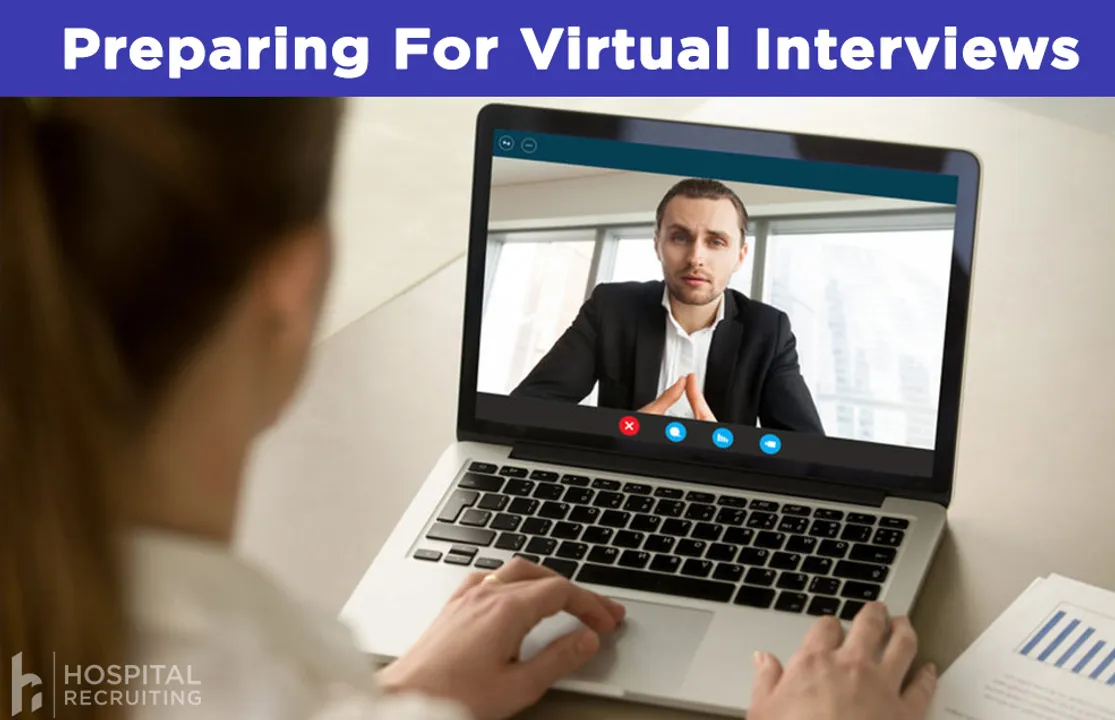How to Prepare for Virtual Job Interviews

Health care organizations are rapidly transitioning to virtual video interviews when evaluating candidates to hire. Candidates must know what to expect when being interviewed virtually. Let's look at common types of virtual interviews, common types of questions asked, and how to prepare for interviews.
Asynchronous and Live Virtual Interviews
There are two main types of virtual interviews.
On-demand or asynchronous virtual interviews may feel awkward to many candidates. There is no person to speak to or look at during the interview. Applicants respond to pre-recorded, texted, or written questions. The job seeker answers the questions and submits the interview, which is reviewed later by the interviewer. On-demand interviews can be helpful, as they allow you to get a general flavor for the kinds of skills that the organization desires. You may also gain insight into organizational values. You can usually conduct an asynchronous interview at your convenience via your webcam.
Asynchronous interviews save health care organizations time and expense. Some organizations afford opportunities for candidates to delete and rerecord the answers to questions until they are satisfied that they have presented themselves in the best light. Applicants do not have an opportunity to interact directly with the interviewer. Health care organizations often use asynchronous virtual interviews as preliminary interviews. They are used to weed out undesirable or less qualified applicants. Potential candidates are selected based on the answers to the questions asked. Employers evaluate the candidate's demeanor and presentation. Live virtual interviews often follow asynchronous interviews
Live interviews use video conferencing technology and are conducted in real-time, just as face-to-face interviews are. These interviews are like Zoom meetings. The benefit of these kinds of meetings is that they allow you and the interviewer to observe body language, ask questions, and have a spontaneous conversation. Most applicants find this type of interview natural since most of us have regularly used video conferencing since the epidemic arose.
Three types of interview questions
Most types of interviews address three main areas.
General questions provide you with opportunities to introduce yourself. These questions provide you with opportunities to share a bit of your background and your interests. It is a chance for you to explain what attracts you to the position.
Behavioral questions are skill questions. These questions ask you about your past work experience. These questions enable employers to evaluate if you will be able to perform the tasks that the job requires.
Situational questions are open-ended questions that help interviewers evaluate how you respond to challenging situations. The interviewer may ask you what you would do when faced with a particular case. More commonly, you will be asked to reveal challenges you have faced in past positions. Have examples in mind as you prepare for the interview. Keep in mind that interviewer is attempting to glean information about your strengths and weaknesses. Other traits evaluated include your ability to react under pressure, resiliency, and personal relationship skills. Your aptitude to "fit in" with the organization's mission will be considered based on your responses.
Prepare for the interview
Prepare for a virtual interview in much the same way as you would an in-person meeting. However, there are additional steps that you must take to ensure an exceptional, problem-free interview. Here are some tips that you can use to prepare:
- Gather as much information about the organization as possible.
- Review your resume or CV. Identify critical points that you want to make. Focus on clinical, interpersonal, resiliency, and judgment skills.
- Practice! Ask colleagues to interview you virtually. Review the video carefully and practice until you are completely satisfied with your presentation. Evaluate what you say and how you present yourself.
- Look directly into the camera. Sit up straight. Speak clearly. Avoid making distracting movements with your hands.
- Carefully review the instructions provided from the organizations regarding the interview process.
- Familiarize yourself with the technology employed. Clarify any questions you have about the process before the interview.
- Use a computer rather than a tablet or telephone to do the interview.
- Ensure that your environment is quiet, interruption-free, and well-lit.
- Check your equipment, including internet speed, camera, lighting, and microphone.
- Dress as you would for an in-person interview. Do not wear busy prints or bright colors.
Be well prepared, and you will exude confidence. You will focus on the interview and not be concerned about the process or your presentation.
Related Posts
